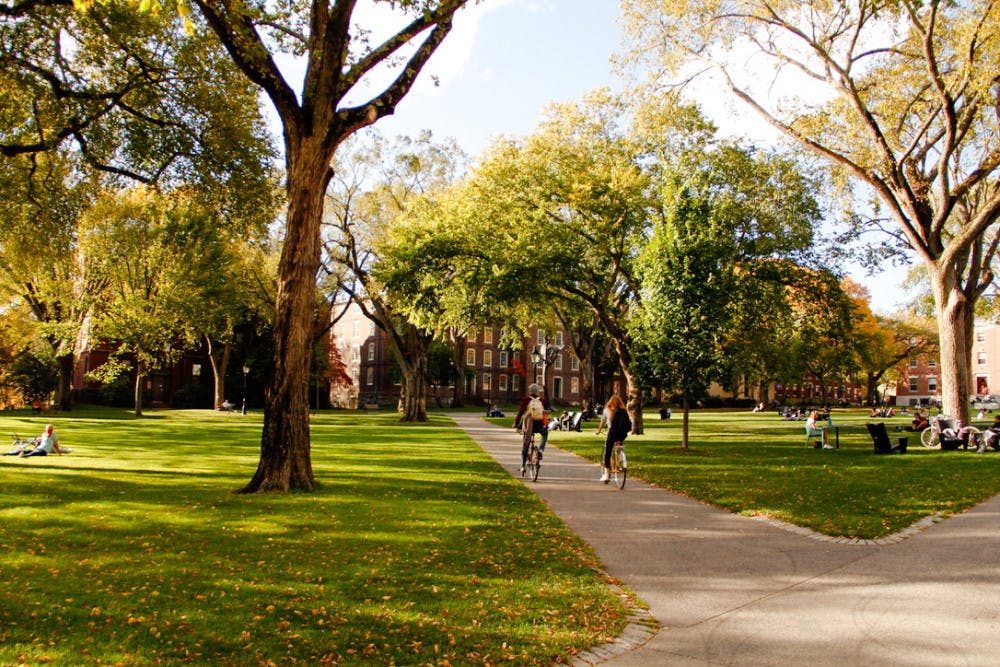Although first-years will not arrive on College Hill until at least the spring semester due to the coronavirus pandemic, the University’s Meiklejohn Program is currently working remotely to prepare and mentor the class of 2024 for life at Brown.
First-year students do not have a full class load this semester, but some have taken advantage of the opportunity to take one University course for credit, free of charge. The program, which facilitates peer advising for first-years, is supporting all students in the incoming class, regardless of whether or not they are currently taking a course.
Students have been matched with an academic advisor and a Meiklejohn Peer Advisor in groups of five to six. Like past years, they still have access to academic advising, student support deans and academic support initiatives such as peer tutoring, the Writing Center, CareerLAB and the Curricular Resource Center, wrote Connor Jenkins '22, one of the Meiklejohn Leaders who trains the other peer advisors, in an email to The Herald.
The program has not only shifted online; it has also shifted its advising content.
The Meiklejohn program is happening "at a more limited capacity" this semester, "given that we don't have access to first-years in person, and also because first-years are only taking one class," Meiklejohn Leader Phoebe Kennan ’21 told The Herald. The job is less about advising class choices, “but more about getting first-years to get involved with campus life before coming back and really starting their time at Brown in January," she added.
Despite the different nature of Meiklejohns’ advice, Kennan stressed the program’s priority is providing support to first-year students.
"The most important thing for us … is that the advisees feel supported or attached to a support network, and for us to reach out to let students know that there's an avenue of communication between the University and the student" she said, so that student concerns or questions could be addressed.
Kennan said it is important as a Meiklejohn Peer Advisor to try to find the line between reminding students they are there for them if they want to reach out and “at the same time not to make them feel like you are a parent, always checking in."
This is especially true when first-years are scattered around the world and participating in different kinds of activities.
One of Kennan’s mentees is currently backpacking while another is taking a prerequisite course for a concentration requirement. Jenkins’ advisees are focusing mostly on engaging the community in their respective hometowns and families.
Advising remotely can make it challenging to know how these students are doing.
"I have found the most difficult part of interactions to be gauging how people are doing because of the ease with which we can all burrow into our physical spaces and disconnect from the virtual world," Jenkins wrote.
Advisees face a similar difficulty. "It's really hard to meet a stranger over Zoom and feel super comfortable talking about all your questions and concerns — in that way it's definitely a barrier," said Saadhya Bahudodda ’24, a first-year mentee. Due to the virtual format, meetings have been “super formal” and “structured,” she said, though she looks forward to seeing her advisor when she gets to Brown.
“I assume it’d be nice to have familiar faces around campus,” Bahudodda said, “and when you see each other, you can casually talk.”
Kennan agreed that building in-person relationships is easier than remote ones, but she also suggested that the shift to a remote space has catalyzed reflection on what's most important to the Meiklejohn Program.
"Being forced into the virtual mode has also forced (the College) to update our techniques and strategies in a way that we probably would have done more slowly before," and the process encouraged faculty to be comfortable with web resources, said Carol Cohen, senior associate dean for class advising and health and personal issues.
Though the structure of the program has largely remained the same, the Meiklejohn training process and the student engagement dynamic has changed to allow for more flexibility. In usual semesters, the Meiklejohn Leaders would receive training three weeks before the start of the fall semester, while training for Peer Advisors would take place at the beginning of the fall semester, after which Peer Advisors would join their faculty advising partners to meet with first-year students in-person.
This year, instead, the training for Peer Advisors took place asynchronously through a digital format that included PowerPoint presentations which ran through the aspects of advising, timelines and logistics. This training also prepared them to advise first-year students correctly according to the changes to the University’s COVID-19 policies, Kennan said.
Peer Advisors were also asked to watch videos concerning advising and complete a Google form consisting of a few case studies that asked them what they would do in different hypothetical advising situations. The Meiklejohn Leaders would then proceed to evaluate the preparedness of Peer Advisors through the form, Kennan added.
The Meiklejohn Program and other student advising programs still face an undetermined plan for the spring and summer semesters due to the changing public health and University guidelines.
"Everyone is concerned about what next semester is going to look like, how prereg(istration) is going to run. The biggest concern is really uncertainty. Even when answers are announced or put out there, it's still within definite parameters of uncertainty," Yolanda Rome, associate dean for class-year advising told The Herald
Kennan said that for the Meiklejohn Program, there will be more rigorous training for Peer Advisors in preparation for the spring semester, but the specific format and the programming for the summer semester are still up in the air.
Summer semester Meiklejohn advising is likely to be limited by capacity, especially given that some of the Peer Advisors will be graduating or have other activities that would interfere with participation in the program during the summer, Kennan said.

ADVERTISEMENT




